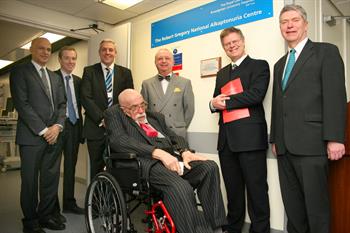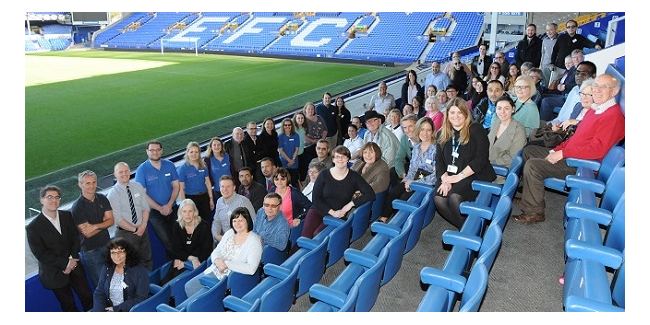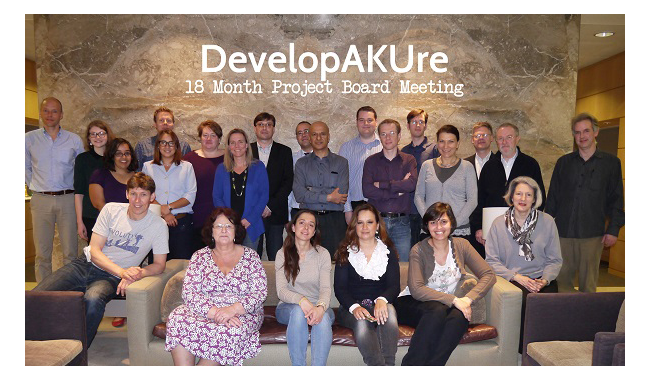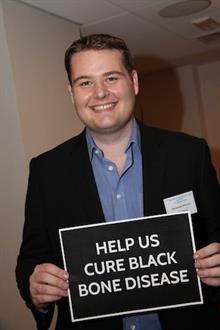Yesterday was Oliver’s six year anniversary at the AKU Society. Lots has changed over the last few years and in today’s blog, he tells us about some of the achievements and challenges over that time.
How has the AKU Society changed over the past 6 years?
I started at the AKU Society back in 2010. Back then, the group had just moved from Liverpool to Cambridge, and there was just two of us:
Nick Sireau and myself. We were based in a tiny office, with a leaky roof, above a closed down DIY superstore. We spent the first year trying to raise funding to allow us to begin new projects and start making a difference to the lives of AKU patients.Six years later, and we have moved to a much larger office based at the Cambridge Citizen’s Advice Bureau, where we share with other charities, and have a dry roof! The team has expanded to five full-time staff, and we can now achieve much more. One of those staff is
Hannah Harrison, our Patient Support Manager, who enabled us to massively increase our patient contact – meaning we could start offering direct patient support, including regular workshops and home visits.We also launched the
National AKU Centre (NAC) in 2012, and shortly afterwards, began the
DevelopAKUre clinical trials. Along with the research we had supported in Liverpool, this meant that we have started to investigate a potential new drug called nitisinone. Now, nitisinone is available for UK patients at the NAC, and is being studied in DevelopAKUre.
What has changed the most during this time?
For me, the biggest development at the AKU Society has been our increasing ability to support patients. We can now offer patient workshops, home visits, and excellent care for patients attending the NAC and DevelopAKUre. Feedback for these services has been great, and it’s something we’re keen to continue and improve where possible.

One of the new ideas for patient support was an International Patient Workshop, reflecting that our scope to help patients extends outside of the UK, to all patients worldwide. After 18 months of fundraising, we could finally hold the event in Liverpool on 20 April 2016. It was a great success, with everyone who attended, saying they appreciated meeting other patients and learning more about AKU and ways to cope with the disease.

I think the impact of the International Workshop is best shown by the example of one patient: Marcela from Argentina. Not only was she the person who travelled the furthest (around 7,500 miles), but also this was the first time she had ever met another AKU patient. She explained how amazing it was to find other people who had experienced the same problems as her and couldn’t believe how much help was on offer. Helping people like Marcela is why the AKU Society exists.
What has been your proudest achievement?
When I first started at the AKU Society, I had a conversation with Prof Ranganath (our medical director, and lead at the NAC and in DevelopAKUre). He told me about the potential of nitisinone as a treatment for AKU, and mentioned that he hoped one day we could study the drug to test its effectiveness in AKU patients.After a few years of building collaborations, such as with
Sobi, the pharmaceutical company that owns nitisinone, and
PSR Group, a company that plans and monitors clinical trials; as well as raising funding through the European Commission, we finally launched the DevelopAKUre clinical trials.

My proudest moment therefore is definitely making Prof Ranganath’s dream of investigating nitisinone as a possible treatment for our patients a reality. The whole team has at some point visited the Royal Liverpool University Hospital and met patients taking nitisinone (either at the NAC or in DevelopAKUre), and every time has come back saying how grateful patients are for having the chance to try a possible treatment.
What do you hope to achieve over the next 6 years?

I think the next six years are going to be very important for AKU patients. The DevelopAKUre clinical trials are over halfway now, and due to finish in 2018. By 2019, we should have definite proof whether nitisinone is a safe and effective treatment for the disease. At that point, I think the AKU Society’s goals will change. If nitisinone is shown to be a good treatment, then we’ll focus on increasing access to patients worldwide. Patients in the UK will still have access through the NAC, but patients abroad will have varying access, and a lot of work will need to be done to ensure everyone can get treatment. If nitisinone is shown not to work in AKU, then we’d need to increase our support of research into other treatment.
I also hope that the patient support work will increase. We currently aim to provide two patient workshops in the UK a year, with occasional international workshops. Our future plans, however, include focused workshops for children with AKU, more international workshops and perhaps workshops helping families and carers.
At the end of another six years (in 2022), I hope that the majority of patients worldwide have access to effective treatments for their disease, and as many patients as possible benefit from excellent patient support from the AKU Society. I think it’ll be an exciting time for everyone involved, and I’m thrilled to see it develop.If you’d like to discuss any of the future plans for the AKU Society, or have your own ideas to share, please do contact
